The Role of Adaptogens in Supporting Recovery on Fewer Hours of Sleep
🌿 Introduction: The Modern Sleep Deficit
Let’s be honest — modern life rarely gives us eight uninterrupted hours of sleep.
Late-night deadlines, screen exposure, stress, or just an overactive mind can easily cut our rest short. The result? Fatigue, brain fog, and mood swings the next day.
But here’s the hopeful twist 🌅 — your body is remarkably adaptable. With the right support, it can recover, rebalance, and perform even when you didn’t sleep enough. One class of natural compounds shines brightest in this scenario: adaptogens.
Adaptogens are plants and herbs that help your body adapt to stress — physical, mental, or emotional. They don’t just stimulate or sedate you; instead, they normalize biological functions, helping your system return to equilibrium.
When you’re running on fewer hours of sleep, adaptogens can:
⚡ Boost natural energy production
💆 Calm the stress response
🧠 Protect neurons from oxidative damage
❤️ Support hormonal balance and mood
🔄 Accelerate recovery and resilience
Let’s explore how adaptogens work, the most effective ones for sleep-deprived recovery, and how to combine them with breathwork and therapeutic practices for total mind-body restoration.
Looking for supplements for Brain Fog? Click here.
🧬 What Are Adaptogens, Really?

The term “adaptogen” was coined in the mid-20th century by Russian scientists studying how certain herbs helped soldiers and athletes endure fatigue and harsh conditions.
To qualify as an adaptogen, an herb must:
Increase the body’s resistance to stress
Maintain balance (homeostasis) rather than push in one direction
Be non-toxic and safe for long-term use
Adaptogens influence the hypothalamic-pituitary-adrenal (HPA) axis, the body’s main stress control system. When you lose sleep, this axis becomes overactive, raising cortisol and draining neurotransmitters like dopamine and serotonin. Adaptogens modulate these responses, preventing your system from tipping into burnout.
⚙️ How Sleep Loss Affects Your Stress System
Before exploring specific herbs, let’s understand what short sleep does internally:
🩸 Cortisol spikes early and stays high, preventing deep rest and calm focus.
🧠 Dopamine and serotonin drop, leading to irritability and low motivation.
🧬 Mitochondria slow down, reducing energy and repair capacity.
🔥 Inflammation rises, impairing recovery and immune balance.
Adaptogens help by recalibrating these systems — gently nudging your body toward balance and endurance rather than overstimulation.
🌱 Section 1: Top Adaptogens for Sleep-Deprived Recovery
Let’s break down the most evidence-based adaptogens that support recovery on fewer hours of sleep.
🧠 Rhodiola Rosea: The Fatigue Fighter
Known as the “golden root,” Rhodiola enhances mental performance and endurance under fatigue. It boosts ATP energy production, balances cortisol, and improves focus without overstimulation.
Why it helps:
Reduces perceived exhaustion
Supports cognitive function under stress
Balances mood and motivation
Best time to take: Morning or midday.
Typical dose: 200–400 mg extract (3% rosavins, 1% salidroside).
💪 Ashwagandha: The Cortisol Balancer
Ashwagandha is one of the most well-studied adaptogens for restoring sleep quality and hormonal balance. It lowers cortisol, supports thyroid health, and improves resilience.
In short: it calms your nervous system while subtly energizing you from within.
Why it helps:
Improves sleep efficiency and relaxation
Enhances physical recovery and testosterone balance
Reduces anxiety and brain fog
Typical dose: 300–600 mg root extract daily.
⚡ Panax Ginseng: The Cellular Energizer
Panax ginseng supports glucose metabolism, mitochondrial function, and oxygen uptake. It’s ideal for mornings after a short night because it gives smooth energy and focus.
Why it helps:
Improves endurance and memory
Enhances mood and motivation
Reduces fatigue from overwork
Typical dose: 200–400 mg standardized extract.
💎 Eleuthero (Siberian Ginseng): The Endurance Herb
Eleuthero helps you stay alert and physically strong when running on little sleep. It’s popular among athletes for its ability to extend stamina and enhance stress tolerance.
Why it helps:
Regulates adrenal hormones
Protects against stress-induced fatigue
Boosts immune response under sleep loss
Typical dose: 300–1,200 mg extract per day.
🌼 Schisandra Chinensis: The Brain-Body Connector
Schisandra berries improve liver detoxification, oxygen efficiency, and endurance. They also support neurotransmitter balance, which helps sustain calm alertness.
Why it helps:
Improves focus and memory retention
Reduces mental fog
Promotes hormonal and liver recovery
Typical dose: 500–1,000 mg/day (extract).
🌺 Holy Basil (Tulsi): The Emotional Reset
When lack of sleep leaves you irritable or anxious, Holy Basil helps restore emotional equilibrium. It acts as a natural serotonin modulator and cortisol stabilizer.
Why it helps:
Reduces stress-induced anxiety
Promotes calm clarity
Improves resilience to emotional fatigue
Typical dose: 500–1,000 mg/day (leaf extract).
🌊 Cordyceps: The Oxygen Optimizer
Technically a fungus, Cordyceps militaris behaves like an adaptogen by enhancing oxygen uptake and cellular energy. It’s especially helpful for morning recovery and exercise performance after poor sleep.
Why it helps:
Increases VO₂ max (oxygen efficiency)
Supports mitochondria and ATP synthesis
Enhances motivation and stamina
Typical dose: 1–2 g extract/day.
🍄 Reishi Mushroom: The Nighttime Recharger
Reishi is both an adaptogen and a natural relaxant. It reduces cortisol before bed, promotes parasympathetic activation, and improves sleep depth — so your few hours of rest go further.
Why it helps:
Enhances REM and deep sleep
Supports immunity
Calms racing thoughts
Typical dose: 500–1,000 mg extract, taken before bed.
🪵 Licorice Root (Glycyrrhiza Glabra): The Cortisol Stabilizer
Licorice root can extend the half-life of cortisol when levels are too low after chronic stress or sleep debt, giving a gentle energy lift without caffeine.
Caution: Avoid long-term use if you have hypertension.
Typical dose: 200–400 mg/day.
🧬 Maca Root: The Hormonal Harmonizer
Maca supports the HPA axis and sex hormone balance, reducing fatigue and emotional instability from short sleep. It’s often paired with Ashwagandha for holistic recovery.
Typical dose: 1–3 g powder or 500 mg extract/day.
Looking for supplements for Brain Fog? Click here.
💊 Section 2: How Adaptogens Help on Short Sleep
When sleep is reduced, adaptogens work on three primary systems:
1️⃣ The HPA Axis (Cortisol Control)
Adaptogens normalize cortisol, reducing morning grogginess while preventing evening overstimulation.
2️⃣ Mitochondria (Energy Generation)
They improve ATP output — literally helping your cells produce energy more efficiently.
3️⃣ Neurotransmitters (Focus & Mood)
Adaptogens support dopamine and serotonin, which are crucial for motivation and positivity when you’re tired.
Together, these effects help you feel clearer, calmer, and more resilient, even when running on limited rest.
🌬️ Section 3: Breathwork for Energy and Recovery

When sleep-deprived, your breathing becomes shallow and stress-driven. Breathwork resets your oxygen and CO₂ balance, calms the nervous system, and boosts alertness naturally.
🌄 Morning: “Energizing Breath”
Short, rhythmic inhales through the nose and quick exhales through the mouth for 30–60 seconds.
🚀 Increases oxygen flow
⚡ Wakes up the vagus nerve
🧠 Sharpens focus without caffeine
Follow with 3 slow deep breaths to stabilize.
🌬️ Midday: “Box Breathing”
Inhale 4 – Hold 4 – Exhale 4 – Hold 4.
This pattern synchronizes your heart rate with your breath, restoring calm focus during the day.
Use it before tasks that require mental clarity.
🌙 Night: “4-7-8 Breathing”
Inhale 4, hold 7, exhale 8.
Perfect before bed — lowers cortisol, promotes parasympathetic dominance, and helps you fall asleep faster (even for a short nap).
💡 Pro Tip:
Pair Reishi or Ashwagandha with evening breathwork — you’ll deepen rest quality even if you only sleep 5–6 hours.
Want to try Breathwork? Click Here.
💬 Section 4: Therapy and Mental Reset Techniques
When you’re chronically short on sleep, the mind-body connection can fray. Emotional reactivity, rumination, and anxiety can worsen fatigue. Therapy-based methods help restore psychological balance so your body’s energy can go toward recovery, not stress.
🪞 Cognitive Behavioral Therapy (CBT)
CBT helps identify thoughts like “I’m useless without 8 hours” and reframe them into constructive beliefs (“I can still function today by pacing myself”).
This mental flexibility lowers stress hormones and prevents “fatigue catastrophizing.”
🧘 Mindfulness-Based Cognitive Therapy (MBCT)
MBCT trains your brain to observe fatigue without judgment. Instead of fighting your tiredness, you notice it, breathe, and move gently forward.
That awareness reduces mental strain and supports recovery through parasympathetic activation.
❤️ Compassion-Focused Therapy (CFT)
CFT teaches self-kindness during exhaustion. Lack of sleep often amplifies inner criticism — you get frustrated with yourself for being tired. Compassionate self-talk rebalances emotional centers and reduces cortisol.
🔄 Acceptance and Commitment Therapy (ACT)
ACT focuses on aligning daily actions with values even when you’re not at your best. You stop wasting energy resisting fatigue and use it efficiently toward meaningful tasks.
Looking for online therapy ? Click Here.
☀️ Section 5: How to Combine Adaptogens, Breathwork, and Therapy
Let’s combine everything into a daily recovery framework for short-sleep days.
🌅 Morning Routine
Hydrate immediately (water + pinch of salt) 💧
Take: Rhodiola, Ginseng, and B-Complex vitamins
Do: Energizing breathwork for 1–2 minutes
Light exposure: Step outside for sunlight to reset your circadian rhythm 🌞
🕒 Midday Routine
Take: Schisandra or Cordyceps
Practice: Box breathing before intense work
Eat: Protein + complex carbs to stabilize blood sugar
🌙 Evening Routine
Take: Reishi + Ashwagandha or Holy Basil 🌿
Do: 4-7-8 breathing before bed
Reflect: Practice 5 minutes of gratitude journaling or compassionate thought (“I did enough today.”)
Even on 5–6 hours of sleep, this combination amplifies recovery signals, lowers stress, and increases alertness the next morning.
🧠 Section 6: Adaptogens vs. Stimulants
It’s tempting to reach for caffeine or energy drinks after little sleep, but stimulants often mask fatigue rather than repair it.
| Type | Mechanism | Short-Term Effect | Long-Term Effect |
|---|---|---|---|
| ☕ Caffeine | Blocks adenosine | Energy boost | Tolerance, crash |
| 🌿 Rhodiola | Balances cortisol & ATP | Smooth energy | Improved resilience |
| 🍄 Cordyceps | Boosts oxygen & mitochondria | Steady energy | Cellular repair |
| 🌼 Ashwagandha | Lowers cortisol | Calm focus | Better sleep cycles |
Adaptogens replenish what stress depletes — energy, hormones, and mood stability — making them ideal for sustained recovery.
🔬 Section 7: The Science Behind Adaptogen Synergy
Adaptogens don’t just act individually — their effects amplify when combined.
Example Synergy Stack:
Rhodiola + Ginseng: Enhanced cognitive endurance
Ashwagandha + Reishi: Better sleep depth and cortisol control
Schisandra + Cordyceps: Improved oxygen metabolism and clarity
They act on multiple biological systems — HPA axis, mitochondria, and neurochemistry — creating a layered resilience that keeps you functional under pressure.
🌈 Section 8: Long-Term Benefits of Adaptogen Use
If used consistently (4–8 weeks), adaptogens can help you:
🧘 Improve baseline stress tolerance
🌙 Recover faster from sleep deprivation
💪 Build mental and physical endurance
🧠 Enhance focus and emotional regulation
Over time, you’ll notice that even when sleep isn’t perfect, your recovery capacity stays strong — like having an inner reserve tank of calm, steady energy.
⚖️ Section 9: Safety, Quality, and Dosing
Choose adaptogens from reputable brands with standardized extracts.
Look for:
Third-party testing (for purity and potency)
Clear labeling (mg, active compounds)
Organic or wild-harvested sources
Safety Tips:
Avoid combining multiple strong adaptogens right away — start with one or two.
Cycle herbs every 6–8 weeks to maintain sensitivity.
Consult your doctor if pregnant, breastfeeding, or on medication.
🌟 Section 10: Final Thoughts — Balance Is the Real Power
Adaptogens don’t make you superhuman — they help you become more human, efficiently. They teach your body how to adapt, endure, and thrive despite imperfect conditions.
When combined with mindful breathing and compassionate mental habits, they become part of a resilience toolkit for modern living — a way to keep your calm, clarity, and energy, even when the world doesn’t let you rest enough.
📚 References
Panossian, A., & Wikman, G. (2010). Effects of adaptogens on the central nervous system and the molecular mechanisms associated with their stress–protective activity. Pharmaceuticals, 3(1), 188–224.
Lopresti, A. L., & Drummond, P. D. (2014). Rhodiola rosea L. as a botanical antidepressant. Phytotherapy Research, 28(7), 1117–1124.
Chandrasekhar, K., et al. (2012). A prospective, randomized double-blind study of Ashwagandha root extract in reducing stress and anxiety. Indian Journal of Psychological Medicine, 34(3), 255–262.
Reay, J. L. et al. (2010). Panax ginseng improves mood and cognitive performance during mental tasks. Human Psychopharmacology, 25(6), 462–471.
Spasov, A. A. et al. (2000). Effect of Eleutherococcus senticosus on working capacity and tiredness. Phytotherapy Research, 14(1), 32–37.
Kennedy, D. O. et al. (2016). Schisandra chinensis modulates stress response and mental performance. Nutrients, 8(2), 61.
Teasdale, J. D. et al. (2000). Mindfulness-Based Cognitive Therapy. Journal of Consulting and Clinical Psychology, 68(4), 615–623.
Hayes, S. C. et al. (2011). Acceptance and Commitment Therapy. Guilford Press.
Nagendra, H. R., & Telles, S. (2010). Breathwork and neurophysiology. International Journal of Yoga, 3(1), 2–5.
Related Posts
-

Ashwagandha and Valerian: A Bedtime Combo for Deep Rest and Emotional Reset
Discover the calming synergy of Ashwagandha and Valerian root, two natural sleep aids that help quiet the mind, ease anxiety, and promote deeper rest. Learn how this herbal duo supports the nervous system, balances stress hormones, and restores emotional peace — without next-day grogginess.
-

How to Create a Resilience-Boosting Diet
Discover how to build emotional and physical strength from the inside out with a resilience-boosting diet 🍎. Learn which foods stabilize your mood, how supplements like magnesium and omega-3s strengthen your stress response, and why pairing nutrition with breathwork and therapy creates lasting calm, focus, and vitality 🌿💪.
-

Best Teas and Herbal Blends for Calmness: Nature’s Way to Restore Inner Peace
Ashwagandha, the ancient adaptogenic herb, helps your body find balance during stress. Known as “Indian ginseng,” it supports cortisol regulation, boosts energy, and restores calm clarity. Discover how this powerful root promotes resilience, emotional balance, and steady vitality — one cup at a time. 🌸
-

Parenting and Emotional Strength: How to Raise Children Without Losing Yourself
Empathy is the bridge that connects hearts — the quiet power to understand, feel, and support another’s emotions without judgment. Learn how empathy strengthens relationships, enhances communication, and cultivates deeper compassion in everyday life. 🌿
-

How to Bounce Back from Public Failure: Reclaiming Confidence, Purpose, and Power
Visualization is more than imagination — it’s brain training for resilience. By picturing calm, success, or healing, you activate the same neural pathways as real experience. Learn how daily visualization rewires your brain for confidence, emotional balance, and recovery from stress. ✨
-

Coping with Financial Stress Through Resilience: How to Stay Grounded When Money Feels Tight
Body awareness is the foundation of emotional resilience. By tuning into your body’s signals — tension, fatigue, or calm — you learn to recognize stress before it overwhelms you. Discover how mindfulness, gentle movement, and breathwork can deepen your connection with your body and restore balance from the inside out. 🧘
-

How to Stay Positive During Chronic Illness: A Guide to Emotional Strength and Hope
Creativity is more than art — it’s a form of healing. Whether through painting, writing, music, or small acts of expression, creativity helps release emotion, calm the nervous system, and reconnect you to joy. Discover how to use creativity as a tool for emotional balance, resilience, and self-discovery. 🌿
-

Resilience Tips for Caregivers: How to Stay Strong While Caring for Others
Joy isn’t the absence of pain — it’s the quiet strength to find light even in challenging times. Cultivating joy through small daily moments restores balance, releases stress, and reminds you of life’s beauty. Learn how to reconnect with authentic happiness, rebuild emotional energy, and nurture your nervous system through gratitude, presence, and play. 🌿
-

Building Resilience After a Breakup: How to Heal, Rebuild, and Rise Stronger
Social connection is one of the strongest predictors of emotional resilience. During difficult times, genuine relationships act as anchors — calming the nervous system, reducing stress hormones, and helping you regain perspective. Learn how cultivating real human connection can strengthen your mind, heart, and overall well-being. 🌿
-

How to Stay Emotionally Strong During Job Loss
Your emotions are powered by brain chemistry — a delicate balance of neurotransmitters like serotonin, dopamine, and cortisol. When these chemicals work in harmony, you feel calm, focused, and resilient. Learn how daily habits, nutrition, and mindfulness can support your brain chemistry and boost emotional well-being naturally. 🌿
-

The Role of Hormones in Emotional Stability: How Your Chemistry Shapes Your Calm
Hormones shape more than your body — they shape your emotions, resilience, and sense of calm. From cortisol to serotonin, these chemical messengers influence how you react to stress, connect with others, and recover from challenges. Learn how to balance your hormones naturally to build lasting emotional stability and harmony within. 💫
-

Mitochondria and Emotional Energy: The Cellular Power Behind Your Mood
Breathwork is one of the most powerful tools for emotional regulation and cellular balance. Through intentional breathing, you can calm your nervous system, increase oxygen flow to the brain, and even support mitochondrial energy. Learn how conscious breathing connects body and mind — transforming stress into presence and emotional strength. 🌿
-

Inflammation and Its Impact on Mood Resilience: The Silent Link Between Body and Mind
Inflammation doesn’t just affect the body — it impacts the mind. Chronic inflammation alters brain chemistry, depletes serotonin, and makes emotional recovery harder. Learn how calming inflammation through nutrition, mindfulness, and sleep can restore balance, resilience, and a renewed sense of emotional strength. 💫
-

How Antioxidants Protect Emotional Well-being: The Hidden Link Between Oxidative Stress and Mental Health
Antioxidants do more than protect your body — they defend your mind. By neutralizing oxidative stress, antioxidants support serotonin, dopamine, and brain energy pathways that keep you calm, focused, and emotionally balanced. Discover how foods like berries, green tea, and dark chocolate nourish your brain, boost mood, and strengthen resilience from the inside out. 🌿✨
-

The HPA Axis and Emotional Health: The Hidden Bridge Between Stress and Mind
Neuroplasticity — the brain’s ability to rewire and adapt — is the foundation of emotional healing and resilience. When you face stress, trauma, or change, your neural pathways can reshape themselves to support new patterns of calm, focus, and self-awareness. Learn how daily practices like mindfulness, therapy, and breathwork strengthen neuroplasticity to transform emotional pain into personal growth. 🌸
-

Why Cortisol Control Is Key to Resilience: Mastering Stress to Build Emotional Strength
Controlling cortisol — the body’s main stress hormone — is the secret to lasting resilience. When cortisol levels stay balanced, your mind becomes clearer, emotions steadier, and energy more sustainable. Learn how breathwork, mindset shifts, adaptogens, and daily rhythms can help you calm your stress response and build true inner strength. 🌞💪
-

Dopamine’s Influence on Motivation and Recovery: Reigniting Drive and Balance
Healthy relationships are the foundation of emotional balance and resilience. Whether romantic, familial, or platonic, genuine connection releases dopamine, serotonin, and oxytocin — the brain’s “bonding trio” — helping us feel secure, motivated, and seen. Learn how trust, empathy, and communication not only strengthen your connections but also reshape your nervous system for deeper emotional well-being. 🌿🤝
-

The Role of Serotonin in Resilience: How This “Mood Molecule” Shapes Emotional Strength
Serotonin — often called the “resilience molecule” — plays a vital role in how we handle stress, regulate mood, and recover from emotional challenges. Beyond happiness, this powerful neurotransmitter helps balance the gut-brain axis, stabilize the nervous system, and support emotional flexibility. Learn how nutrition, sunlight, mindfulness, and adaptogens can naturally boost serotonin and strengthen your emotional resilience. 🌞🧠
-

How Neuroplasticity Supports Emotional Growth: Rewiring the Brain for Resilience
Neuroplasticity is the brain’s built-in power to grow, adapt, and heal — and it’s the foundation of emotional transformation. Every mindful breath, compassionate act, or reframed thought strengthens new neural pathways that support resilience and self-awareness. Learn how your brain rewires through daily habits, helping you turn emotional challenges into opportunities for growth and calm. 🌿
-

Tai Chi and Adaptogens for Mind-Body Balance: The Art of Harmonizing Energy and Resilience
Alchemy isn’t just an ancient science — it’s a timeless symbol of transformation and inner balance. By blending the physical and spiritual, alchemy teaches us that change begins from within. Just as metals are refined into gold, we too can transmute emotional pain, stress, and chaos into clarity and strength through mindful practice and self-awareness. 🌙✨
-

Cold Therapy and Emotional Control: Training the Mind Through the Body
Cold therapy isn’t just for athletes — it’s a tool for emotional mastery. By exposing your body to controlled cold, you train your nervous system to stay calm under stress, improving focus, mood, and resilience. This article explores the science of cold exposure, its impact on hormones and the vagus nerve, and how ice baths and cold showers can help you build emotional control, one breath at a time. 🧊🧘♂️
-

How Music Influences Emotional Recovery: The Healing Soundtrack of the Mind
Neuroplasticity — the brain’s ability to rewire and heal itself — is at the heart of emotional recovery. Through mindful habits, music, therapy, and consistent mental stimulation, your brain can form new connections that support resilience and well-being. Discover how neuroplasticity turns pain into growth, helping you rebuild balance, focus, and emotional strength. 🌿
-

Nature Therapy for Building Resilience: Reconnecting With the Healing Power of the Earth
Nature therapy helps rebuild emotional resilience by reconnecting you with the healing rhythms of the Earth. From forest walks to sunlight exposure, nature restores balance to your nervous system, lowers stress hormones, and teaches emotional adaptability. Learn how spending time outdoors can enhance mental clarity, calm anxiety, and awaken your natural capacity to heal. 🌞
-

Breathwork Techniques That Pair with Supplements: The Ultimate Synergy for Stress Relief and Mental Clarity
Breathwork and supplements create a powerful mind-body synergy for stress relief, focus, and energy. By combining intentional breathing with adaptogens, nootropics, and calming nutrients, you can naturally regulate cortisol, sharpen mental clarity, and boost emotional balance. This guide explores the best breathwork techniques and supplement pairings to help you feel centered, calm, and energized from the inside out. 🌿
-

Why Cortisol Balance Matters for Emotional Strength
Balancing cortisol — your body’s main stress hormone — is essential for emotional resilience. When cortisol is chronically high, your mind stays stuck in survival mode, leading to fatigue, anxiety, and emotional instability. This article explores how nutrition, supplements, breathwork, and therapy can help restore healthy cortisol rhythms, regulate the nervous system, and strengthen your ability to handle life’s challenges with calm focus and emotional strength. 🌿
-

Best Supplements for Students During Exam Season: Focus, Energy, and Memory Support
Studying late into the night? Learn which natural supplements can boost focus, memory, and mental stamina during exam season — without the crash. From omega-3s to Bacopa and Rhodiola, discover your brain’s ultimate exam support stack. 🎓🧠
-

Natural Memory Boosters for Seniors: How to Keep Your Mind Sharp and Focused
Stay mentally sharp and confident as you age. Discover science-backed natural supplements and lifestyle habits that boost memory, focus, and brain longevity for seniors. 🌿🧠
-

The Link Between Stress, Cortisol, and Memory Loss
Chronic stress can quietly erode your memory — and cortisol is the key culprit. Learn how stress hormones affect the brain, why the hippocampus shrinks under pressure, and how natural strategies can help you restore memory and mental clarity. 🧠✨
-

How to Build a Daily Supplement Routine for Memory Health
Want to sharpen your memory and stay mentally clear? Learn how to build a daily supplement routine for memory health — from morning focus to nighttime brain repair. Discover science-backed nutrients that boost recall, focus, and long-term cognitive resilience. 🧠🌿
-

Top 5 Natural Supplements for Memory Recall and Focus
Looking to boost memory and concentration naturally? Discover the top 5 supplements — Bacopa, Ginkgo Biloba, Lion’s Mane, Rhodiola, and Phosphatidylserine — that enhance focus, recall, and long-term brain health. 🧠✨
-

Top Supplements to Balance Mood Naturally
From omega-3s to adaptogens, discover the top natural supplements proven to support emotional balance, reduce stress, and promote inner calm — safely and effectively. 🌿✨
-
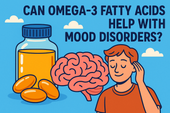
Can Omega-3 Fatty Acids Help with Mood Disorders?
Omega-3 fatty acids do more than support heart health — they can help balance mood, reduce depression, and calm anxiety. Discover how EPA and DHA nourish your brain, fight inflammation, and support emotional well-being from within. 🌊🧠
-

Vitamin D and Mood: The Sunshine Vitamin for Emotional Balance
Could the key to emotional balance be as simple as a little sunlight? Discover how vitamin D — the sunshine vitamin — influences serotonin, reduces inflammation, and helps you feel more positive and resilient year-round. ☀️💛
-

The Role of Magnesium in Reducing Irritability and Low Mood
Feeling on edge or emotionally drained? Magnesium could be the missing link between your body and your mood. Discover how this essential mineral reduces irritability, balances neurotransmitters, and helps your nervous system find calm again. 🌿✨
-
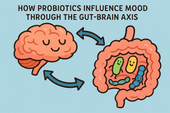
How Probiotics Influence Mood Through the Gut-Brain Axis
Discover how probiotics can do more than support your digestion—they can actually uplift your mood. This article explores the fascinating gut-brain axis and how balancing your gut bacteria through probiotics may help reduce anxiety, improve emotional stability, and support long-term mental well-being. 🌿🧠
-
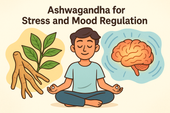
Ashwagandha for Stress and Mood Regulation
Discover how Ashwagandha, the powerful adaptogenic herb 🌿, helps your body manage stress and regulate mood. Learn how it balances cortisol, boosts GABA and serotonin, and supports emotional stability — helping you feel calm, focused, and resilient every day.
-
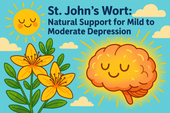
St. John’s Wort: Natural Support for Mild to Moderate Depression
Discover how St. John’s Wort, the “sunshine herb” 🌼, naturally supports mild to moderate depression. Learn how it boosts serotonin, balances mood, and promotes emotional resilience — with research showing its effectiveness compares to antidepressants, but with fewer side effects.
-
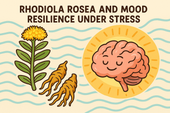
Rhodiola Rosea and Mood Resilience Under Stress
Discover how Rhodiola rosea helps your body adapt to stress 🌿. Learn how this powerful adaptogen balances cortisol, supports serotonin and dopamine, and strengthens emotional resilience — helping you stay calm, focused, and energized under pressure.
-
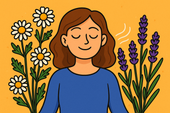
Chamomile and Lavender: Herbal Calm for Emotional Fluctuations
Discover how chamomile and lavender bring calm to emotional ups and downs 🌿. Learn how these two soothing herbs balance your nervous system, ease anxiety, and support restful sleep — naturally helping you find peace and emotional stability.
-
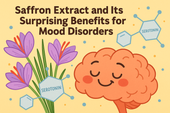
Saffron Extract and Its Surprising Benefits for Mood Disorders
Discover how saffron extract — the golden spice of joy 🌸 — can naturally support mood balance, ease anxiety, and lift mild depression. Learn what science says about its serotonin-boosting power, the ideal dosage, and how this ancient remedy compares to modern antidepressants.
-
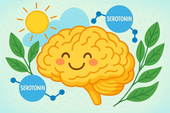
5-HTP and Serotonin: A Natural Path to Lifting Mood
Discover how 5-HTP naturally boosts serotonin 🌞 — the neurotransmitter behind mood, sleep, and emotional balance. Learn how this plant-derived compound supports happiness, reduces anxiety, and improves rest by helping your brain create more serotonin the gentle, natural way.
-
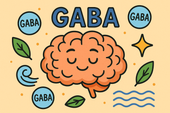
GABA Supplements for Reducing Anxiety and Mood Swings
Discover how GABA supplements can help reduce anxiety and balance mood naturally 🌿. Learn how this calming neurotransmitter works to quiet the mind, ease stress, and improve sleep — plus which nutrients and habits can boost your body’s own GABA production for long-term emotional stability.
-
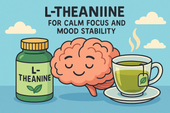
L-Theanine for Calm Focus and Mood Stability
Discover how L-theanine, the calming compound found in green tea 🍵, promotes focus, relaxation, and mood stability. Learn the science behind how it balances neurotransmitters, reduces stress hormones, and enhances clarity — helping you stay centered, calm, and productive without sedation.
-
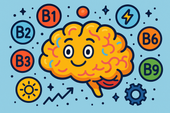
B Vitamins and Brain Chemistry: Supporting Energy and Emotional Balance
Discover how B vitamins power your brain chemistry ⚡. Learn how B6, B9, and B12 support serotonin, dopamine, and energy production — helping boost focus, mood, and emotional balance. From diet to supplements, explore how this vital nutrient group keeps your mind resilient and your energy steady.
-

N-Acetyl Cysteine (NAC) and Mood Disorders: What the Research Says
Learn how N-Acetyl Cysteine (NAC) supports brain health and mood balance 🧠. Discover how this antioxidant helps reduce oxidative stress, regulate glutamate, and improve emotional stability in depression, bipolar disorder, and anxiety — backed by cutting-edge psychiatric research.
-

Supplements for Bipolar Disorder: What May Support Stability
Discover the best supplements for bipolar disorder 🌿 that may support emotional stability and brain health. Learn how nutrients like omega-3s, magnesium, vitamin D, and NAC can help reduce inflammation, balance neurotransmitters, and complement traditional treatment safely.
-

Natural Mood Support During Seasonal Affective Disorder (SAD)
Feeling low as the days grow darker? 🌤️ Learn how to support your mood naturally during Seasonal Affective Disorder (SAD) with light therapy, supplements like vitamin D, omega-3s, and magnesium, plus nourishing foods, breathwork, and daily routines that help your inner light shine even in winter.
-

How Adaptogens Can Help Manage Stress-Related Mood Disorders
Discover how adaptogenic herbs like ashwagandha, rhodiola, and reishi help your body adapt to stress 🌿. Learn the science behind how these natural plants regulate cortisol, stabilize mood, and support resilience — so you can manage anxiety, fatigue, and emotional burnout more naturally.
-

Can Curcumin Reduce Inflammation Linked to Depression?
Can the golden spice really brighten your mood? 🌿 Learn how curcumin, the active compound in turmeric, helps reduce inflammation linked to depression. Discover the science behind its anti-inflammatory, antioxidant, and brain-supporting effects — and how to take it effectively for emotional balance.
-

Best Supplements for Emotional Regulation in Mood Swings
Discover the best supplements for emotional regulation 🌿. Learn how nutrients like magnesium, omega-3s, and adaptogens like ashwagandha and rhodiola can help balance mood swings, calm the nervous system, and promote long-term emotional resilience — naturally and safely.


















































